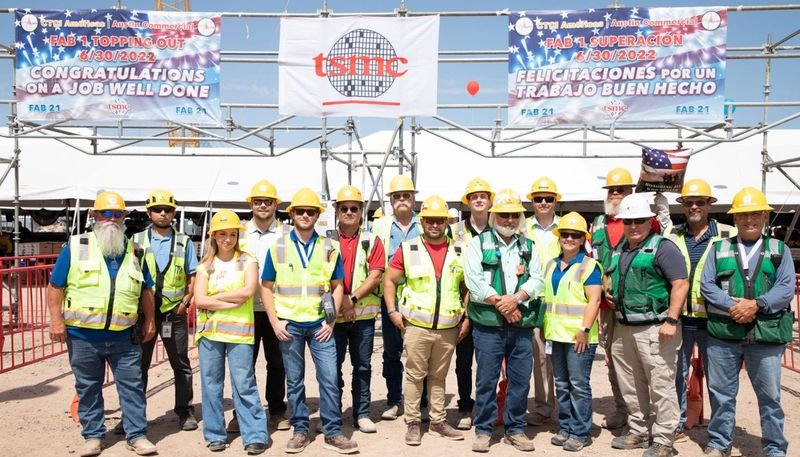Apple chipmaking partner Taiwan Semiconductor Manufacturing Company (TSMC) has responded to concerns about the safety and potential U.S. job losses during the construction of its Arizona chip plant.
A company statement denied that there were any safety issues at the plant construction site and also addressed the concerns of some that the chipmaker’s plans might impact U.S. jobs.
In 2020, TSMC announced it would build and operate an advanced semiconductor factory in Arizona. The facility is expected to turn out approximately 20,000 chips per month using TSMC’s latest 5-nanometer fabrication process. The company claimed that the project would create over 1,600 high-tech professional jobs directly, and thousands of indirect jobs in the semiconductor ecosystem.
TSMC’s total spending on the project, including capital expenditure, will be approximately $12 billion USD from 2021 to 2029.
Apple has said that the plant would make chips for Apple’s devices, though only for older devices.
Recently, concerns were expressed about safety concerns at the plant. as reports came in about serious accidents and the claims of two fatalities at the location. (One of the deaths was described as being caused by a drug overdose. The company was also accused of disguising an evacuation for a dangerous gas leak as an active shooter drill.
Additionally, TSMC is planning to bring in hundreds of workers from Taiwan, due to the project going over budget and falling behind schedule. This led to concerns about the move affecting the future of the 12,000 US workers employed on the site.
Fronteras reported a statement from TSMC on plant safety.
TSMC is deeply committed to workplace safety. In Phoenix, there have been zero work related fatalities since the groundbreaking in 2021. We are regularly audited against known safety standards by organizations such as the Arizona Department of Safety and Health (ADOSH).
TSMC also conducts its own internal audits of safety records against state and national figures. In Arizona, our injury incident rates are significantly lower than state and national benchmarks.
The company claims that Taiwanese workers were necessary, but the move would only be temporary, and would not affect U.S. jobs.
We operate highly sophisticated chipmaking facility systems and unique expertise is required for specific TSMC Arizona construction activities. We are bringing to Arizona select specialized talent with strong experience for this support. These workers will be here temporarily to support the fast ramp-up of this project and to help us build what will be the most advanced semiconductor manufacturing technology in the US. These temporary assignments will not impact the 12,000 workers currently on-site every day nor our U.S.-based hiring.
However, CBS5 reports that many workers are still concerned that they will be replaced, or that they will see their hours cut, reducing their pay.
Employee concerns are likely connected to comments in February from some TSMC managers that said they have concerns about TSMC’s plans for the United States. Taiwanese engineers are accustomed to working long hours and on weekends. There are concerns that American workers are unlikely to want to follow a similar schedule.
Wayne Chiu, an engineer who left TSMC in 2022, said he considered joining the Arizona facility but realized he would likely have to “pick up the slack” for US workers.
“The most difficult thing about wafer manufacturing is not technology,” he said. “The most difficult thing is personnel management. Americans are the worst at this because Americans are the most difficult to manage.”
Three other TSMC employees told the publication that it was a challenge to standardize processes among US engineers, as they questioned their approaches. In Taiwan, engineers follow orders without question.
(Via 9to5Mac)


